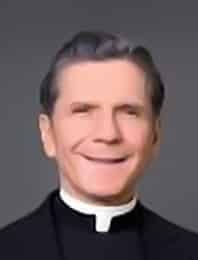Catholics voting in the 2024 election must
ask, ‘Who is my neighbor?’

By the Most Rev. Gustavo García-Siller, M.Sp.S., archbishop of San Antonio, Texas March 05, 2024
As the nation prepares for a general election later this year, the lay faithful are called to exercise their special vocation of making the church present and fruitful in those places and circumstances where it is only through them that she can become the salt of the earth. Faith cannot remain locked up. It comes to us every day, every moment, at any
moment.
It is not enough to say, “I believe,” but we must act accordingly, firmly trusting that God’s
help will come to us. God will tell us how in due time. We are not the word, only the
voice.
In the Bible, we read that King Solomon prayed for an understanding heart, and God
granted him extraordinary wisdom and intelligence. Solomon displayed prudence
without any type of interest or selfishness. He asked God to give him certainty in the art
of governing his people. He was eager for good judgment and common sense when
addressing problems.
We all need wisdom for our lives, whether in our communities, at work or in family life. It
is wise to acknowledge that any ability we have to discern or find solutions comes from
God. It is always good to ask God to lead us so we may act on his behalf. Only from
wisdom will we know how to give clarity and help to others.
In addition, we have a great need for silence, for recollection, for solitude, in the face of
all the turmoil we experience. In silence, our eyes are opened both to the needs of
people and to the gifts and blessings we have been given to come to their aid.
We tend to distance ourselves from what is real. This blurring is followed by concrete
consequences, mistakes and frustration. Growing in awareness of our limits helps us
appreciate our toughest task, leading us to face what we are called to become. Discipleship is born from this internal impulse, rather than from social status, arrogant
self-confidence, self-righteousness or presumed intellectual authority.
Christians are not a social club that gathers on Sundays to receive nice-sounding
catchphrases. We are to influence the heart of society. Being children of God involves
struggle and testing. We are urged to repent and change our lives, including our
thoughts, attitudes and actions, so that we are able to live in a kingdom of justice,
peace, mercy, fidelity, harmony and unity. We are constantly challenged to move
beyond our weakness and self-centeredness.
Where in our lives do we need to be “enlarged” or “stretched”? How strong does our
faith need to be to welcome God’s word spoken by unexpected visitors? Do we dare
ask, “Who is my neighbor?” Or are we even bolder, so as to accept the challenge of
becoming neighbors to God approaching us under the guise of the sick, the stranger,
the imprisoned, the unbeliever, those who do not think or worship as we do? To whom
may I become a better witness of God’s love with the help of God’s grace? How willing
am I to allow for my loving outreach to turn me into an outcast?
Pope Francis has said: “Jesus reverses the perspective…. You can become neighbor to
any needy person you meet, and you will know that you have compassion in your heart,
that is, whether you have the capacity to suffer with the other.”
Love of God is made concrete through love of neighbor, and love of neighbor leads to
love of God. The Lord’s law is very simple to understand but not easy to live by.
Love for our neighbor encompasses their limitations, as annoying as we may find them.
God loves even the people we may find most displeasing. We cannot love God and
hate his children. The Lord leaves no room for us to have enemies. This requires the
strength that comes from a new perception, capable of seeing the good that exists in
each person. This will lead us to remember that we are all created in God’s image.
Who do I choose as my neighbor? Do I allow others to consider me their neighbor? Do I
judge people according to their cultural level, their ethnic origin, their immigration status,
their social standing? Seeing everyone as God sees them is an integral part of our faith.
If we seek only our own well-being, comfort, personal security or power—or if we get
caught up in hyperactivity—we will easily fall into the trap of a life without meaning.
Change in society can start only with a change in each of us, in each of our hearts.
Things do not always have to be as they have been in the past. We can make a new
world.
Many people today feel as if there is no hope, as if they are powerless. God promises
something new. Things can be different, but it must begin with each of us. We must
change our hearts, our attitudes and then our actions. In loving and serving
others—especially the least—we can truly change the world. This transformation is
up to all of us. Let’s make something happen.
